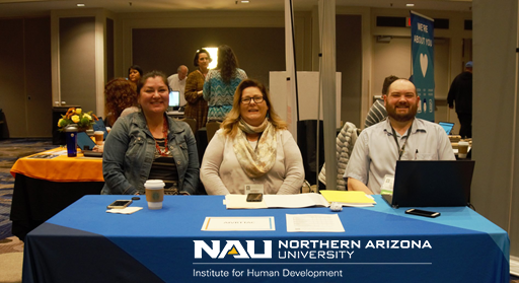The mission of the Institute for Human Development at NAU is to enhance access to all aspects of the human experience for individuals with disabilities. A $5 million grant from the U.S. Department of Education is helping build on that mission for Americans who live on tribal lands.
The grant, a five-year cooperative agreement with the Department of Education’s Office of Special Education and Rehabilitative Services, allows IHD to continue the American Indian Vocational Rehabilitation Training and Technical Assistance Center (AIVRTTAC). This center has played a vital role in supporting vocational rehabilitation personnel who help American Indians with disabilities obtain gainful and fulfilling employment since its inception in 2015.
As a collaboration between the Institute for Human Development (IHD) and the Northwest Indian College Tribal Vocational Rehabilitation (NWIC-TVR) Institute, AIVRTTAC will be able to build on its earlier success in providing culturally responsive education, guidance, training and technical assistance to the 86 American Indian vocational rehabilitation (VR) projects throughout the country.
Since receiving its inaugural award in 2015, AIVRTTAC has provided a variety of services to American Indian VR projects located on tribal lands throughout 26 states, whose job is to help their participants overcome barriers to employment resulting from disabilities. AIVRTTAC services range from intensive, on-site training and technical assistance to widely distributed webinars, newsletters and website resources intended to reach a broader audience within the tribal VR community. In the last six years, AIVRTTAC has provided these on-site services to more than 30 projects nationwide and has reached more than 5,000 users through its online resources.
The renewed funding gives AIVRTTAC the opportunity to continue providing these services while expanding into new areas of training and technical assistance. First, the TVR Institute will continue offering credit and non-credit bearing courses on tribal VR services, increasing the knowledge and skills of tribal VR staff across the country. Secondly, the center plans to emphasize exciting new developments in the field of assistive technology and their potential to increase access to employment for tribal participants with disabilities in partnership with the Arizona Technology Access program. Lastly, AIVRTTAC will be increasing its training and technical assistance in the field of mental health and tribal VR, building on its recent webinars on the subject and working with partners across the nation.
According to professor Kelly Roberts, executive director of IHD, “the work done by AIVRTTAC staff over the last six years has demonstrated direct impact while also empowering tribal VR project staff to share their knowledge and expertise with other projects. This interconnectedness is crucial to the ongoing health of the American Indian VR projects. Together we are stronger.”
This commitment to providing services that are tailored to the unique cultural and historical dynamics involved in tribal VR will continue into the new funding period, fulfilling a vital need for culturally appropriate VR services in the American Indian community.
For more information about AIVRTTAC, contact AIVRTTAC@nau.edu.
About the Institute for Human Development
The Institute for Human Development is one of the nation’s premier centers focused on advancing a vision of the future in which all Americans, including those with disabilities, participate fully in all life experiences. The institute is a dynamic, multi-faceted environment staffed with faculty and professionals representing a range of human service disciplines and offering a broad spectrum of resources and programs for both students and members of the community aimed at advancing its vision of an inclusive society. IHD is home to a wide range of interdisciplinary programs whose efforts collectively support its mission of facilitating ongoing improvements in access, attitude and inclusion for people with disabilities. Some of IHD’s programs provide direct services to the community, while others focus on research initiatives, training and academic programs and/or information dissemination about disability-related topics.



